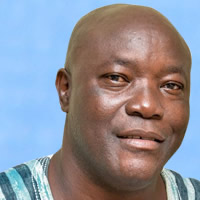Goals And Objectives
Formulation Of Metro Development Goals And Objectives
To enhance the planning and implementation of programmes and also to ensure effective monitoring and evaluation of programme, clear goals were formulation to accelerate the progress towards the achievement of improved standard of living conditions. The goals were classified into over all goal and sector specific goals.
Over all Goal
To improve the quality of life of the people in the Metropolis within a private sector led growth environment and expanding opportunities for vulnerable peoples by the year 2009.
Specific Goals
The specific goals were identified under the three pillars of the Growth and Poverty Reduction Strategy GPRS 11.
Private Sector Competitiveness
Modernised Agriculture
Goal
Increase agricultural Production and wealth creation
Objective
1. To increase crop production by 2009
2. To increase poultry and live stock production by 2009
3. To reduce crop-post losses by 2009
4. To improve Upon the marketing agricultural commodities by 2009
5. To strengthen the capacity of the Metropolitan Directorate of Agriculture by 2006
Support Services
Goal
To increase production levels, and improve assess to utility services in the Metropolis by 2009.
Objectives
1. To increase support for the youth in agriculture
2. To facilitate the provision of credit facilities to producers of non-traditional exports
3. Utility Services
Human Resource Development
Education
To produce functional population through efficient, effective and accessible educational system
- To increase access at basic educational level
- To improve overall academic performance of pupils & students
- To bridge the gender gap in access to education within the Shama Sub-Metro
- To improve participation by communities in the provision of education
- To enhance infrastructural development
- To improve educational management within the metropolis
Health
Goal:- wealth creation through a health lifestyle
Objectives
1. To increase access to health services
2. To improve quality of health delivery
3. To improve efficiency of health service delivery.
4. To foster partnership to improve health delivery.
5. To improve financing to the health delivery.
Good Governance and Civic Responsibility
Goal
To strenthen the administrative and financial capacity of the Assembly towards higher performance and stronger public partnership system.
Objectives
1. To strengthen the delivery capacity of the Assembly
2. To improve on the image of the Assembly
3. To strengthen public/private sector relations with the Assembly
4. To enhance revenue mobilization
5. To strengthen decentralized administration
6. To ensure effective participation at all decision-making points
Monitoring And Evaluation
The National Development Commission and the Regional Co-ordinating Council are legally responsible for the Monitoring and the Evaluation of Development Plans of all Assemblies. The 1992 Republican Constitution by its provision of Article 86 set the stage for the establishment of the NDPC. Under Article 87 section 2 (e) among other functions of the commission is the relevant portion which reads:
The Commission shall at the request of the president or Parliament or on its own initiative monitor, evaluate and coordinate development policies programmes and projects’. The NDPC Act 479 of 1984 highlighted the above functions under sub-section 2 (e) of part (1) section (2). The Local Government Act , Act 462 also provide the basis for the monitoring and evaluation function of the Regional and District Planning Coordinating Units. The RPCU and DPCUs , which are chaired by the Coordinating Directors are the highest monitoring authorities at the regional and district levels respectively.
SAEMA, like any other Assembly, has a Metropolitan Planning Co-ordinating Unit (MPCU). The MPCU is responsible for the assessment of the Assembly’s projects to determine whether planned activities are being undertaken. Though project implementing agencies perform similar monitoring functions, the MPCU’s monitoring role supersedes all. For the effective and efficient performance of these roles, it has been proposed that the MPCU be adequately resourced within the medium term.
As projects are implemented, the need arises to determine the appropriateness, meaningfulness and usefulness of such project. The process is called projects evaluation and could be undertaken midway into a project or after. Thus the MPCU is the responsible agency which must give feedback, as well as direction to decision- making to ensure that planned projects and programmes are well implemented.
Conclusion
The participatory nature of the plan preparation process will mean that all stakeholders will be keen to ensure that planned activities are undertaken in a way that will benefit the people through improvement in the living conditions in the metropolis. It is strongly believed that all stakeholders will play their respective roles to ensure successful plan implementation.It can also be noted that adequate revenue will be raised internally through efficient revenue mobilization system so as to tap all previously untapped revenue sources to fund most of the planned projects and programmes.
Date Created : 11/21/2017 2:25:50 AM





 facebook
facebook twitter
twitter Youtube
Youtube TOLL FREE 0800 430 430
TOLL FREE 0800 430 430 +233 593 831 280
+233 593 831 280 GPS: GE-231-4383
GPS: GE-231-4383 info@ghanadistricts.com
info@ghanadistricts.com Box GP1044, Accra, Ghana
Box GP1044, Accra, Ghana